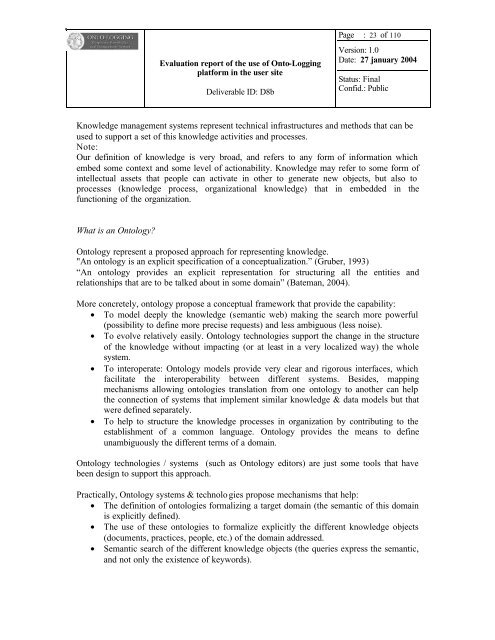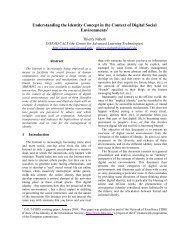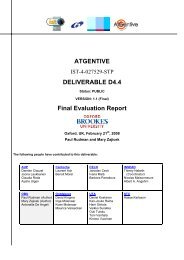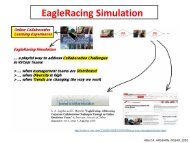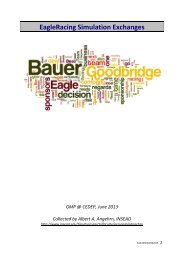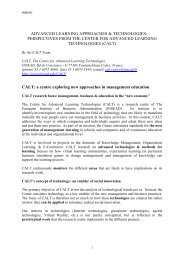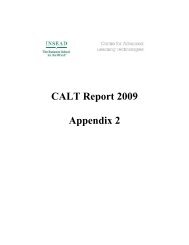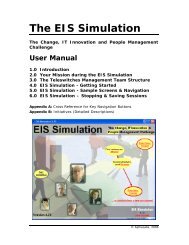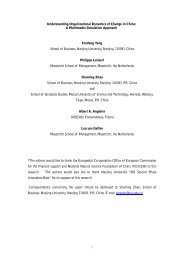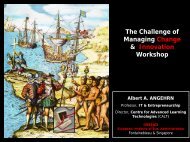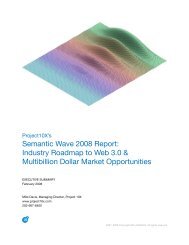pdf 820Kb - INSEAD CALT
pdf 820Kb - INSEAD CALT
pdf 820Kb - INSEAD CALT
Create successful ePaper yourself
Turn your PDF publications into a flip-book with our unique Google optimized e-Paper software.
Evaluation report of the use of Onto-Logging<br />
platform in the user site<br />
Deliverable ID: D8b<br />
Page : 23 of 110<br />
Version: 1.0<br />
Date: 27 january 2004<br />
Status: Final<br />
Confid.: Public<br />
Knowledge management systems represent technical infrastructures and methods that can be<br />
used to support a set of this knowledge activities and processes.<br />
Note:<br />
Our definition of knowledge is very broad, and refers to any form of information which<br />
embed some context and some level of actionability. Knowledge may refer to some form of<br />
intellectual assets that people can activate in other to generate new objects, but also to<br />
processes (knowledge process, organizational knowledge) that in embedded in the<br />
functioning of the organization.<br />
What is an Ontology?<br />
Ontology represent a proposed approach for representing knowledge.<br />
"An ontology is an explicit specification of a conceptualization.” (Gruber, 1993)<br />
“An ontology provides an explicit representation for structuring all the entities and<br />
relationships that are to be talked about in some domain” (Bateman, 2004).<br />
More concretely, ontology propose a conceptual framework that provide the capability:<br />
• To model deeply the knowledge (semantic web) making the search more powerful<br />
(possibility to define more precise requests) and less ambiguous (less noise).<br />
• To evolve relatively easily. Ontology technologies support the change in the structure<br />
of the knowledge without impacting (or at least in a very localized way) the whole<br />
system.<br />
• To interoperate: Ontology models provide very clear and rigorous interfaces, which<br />
facilitate the interoperability between different systems. Besides, mapping<br />
mechanisms allowing ontologies translation from one ontology to another can help<br />
the connection of systems that implement similar knowledge & data models but that<br />
were defined separately.<br />
• To help to structure the knowledge processes in organization by contributing to the<br />
establishment of a common language. Ontology provides the means to define<br />
unambiguously the different terms of a domain.<br />
Ontology technologies / systems (such as Ontology editors) are just some tools that have<br />
been design to support this approach.<br />
Practically, Ontology systems & technolo gies propose mechanisms that help:<br />
• The definition of ontologies formalizing a target domain (the semantic of this domain<br />
is explicitly defined).<br />
• The use of these ontologies to formalize explicitly the different knowledge objects<br />
(documents, practices, people, etc.) of the domain addressed.<br />
• Semantic search of the different knowledge objects (the queries express the semantic,<br />
and not only the existence of keywords).


